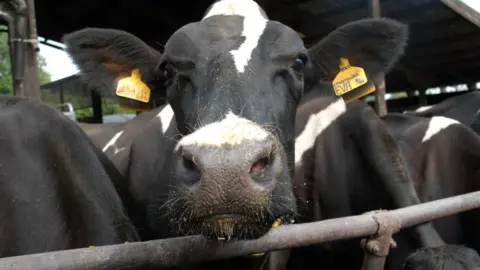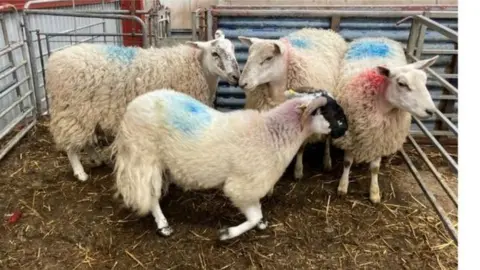Coronavirus: Dairy sector to get £11m in Covid-19 support
 BBC
BBCThe dairy sector will get the biggest slice of executive funding set aside to support farmers hit by Covid-19 losses.
Stormont previously agreed a package to compensate farmers who saw prices slide as demand fell when pubs and restaurants closed.
The money is expected to be paid out in August, after enabling legislation is passed.
The food service sector, which includes catering and canteens, takes about a third of agricultural produce.
Agriculture Minister Edwin Poots has decided that the dairy industry will get £11m towards a drop in milk prices experienced when global markets for dairy powders, cheese and butter fell sharply.
The beef sector will be the other main beneficiary, receiving £7m towards losses for animals slaughtered at the height of the pandemic.
There had been calls for the wider sheep sector to get significant support too as farmers suffered due to low incomes.
But only farmers who sold spring lambs at the height of the pandemic can currently avail of support set at £232,000.

Companies that produced ornamental plants and suffered due to the spring closure of garden centres are to get about £1.5m.
The potato industry, which was left with produce due to closure of fast food and other outlets, will get a similar amount.
The executive agreed to set aside £25m to help farmers, with a further £3.6m being found within the Department of Agriculture, Environment and Rural Affairs (DAERA) budgets to supplement it.
'Flat rate for dairy farmers'
The remaining £7m is being held back in case it is needed later in the year, should there be further market turbulence due to the impact of Covid-19.
In order to be eligible for support, beef and sheep farmers will have to owned animals for a 30-day period before slaughter.
One hundred per cent of their losses are being covered by the fund because officials judged they were less likely to have benefited from other income support schemes due to low profits.
Eligible dairy farmers will be paid a flat rate for every litre of milk produced, based on information from their processors.
The cash they receive should cover about 80% of dairy losses.
